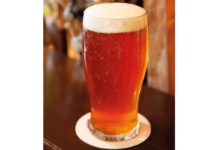Innis & Gunn eyes growth after passing significant milestone

By Dave Hunter
<4>EDINBURGH beer company Innis & Gunn is planning a significant drive for its lager after its turnover topped £10 million.
Announcing results to the end of December 2013, the firm revealed turnover had increased to £10.5m, with the UK accounting for 29% of overall sales volumes.
Speaking to SLTN, Dougal Sharp – who led a management buyout of the company in 2008 to secure independence from former partner firm William Grant & Sons – said UK consumers are now “better informed and more willing to try new things”.
“Beer is cool again,” he said.
“There’s a willingness to try fuller-flavoured products.
“It’s similar to what happened with wine 25 years ago; before we knew it we had a wine culture.
“This is an amazing time for beer.”
Last year saw the launch of the Innis & Gunn lager, which has since secured listings in bars across Scotland as well as in the off-trade.
Sharp said Innis & Gunn will embark on a significant push for the product in the new year in order to further increase its presence in the on-trade.
“We’re very ambitious for the lager,” said Sharp.
“Consumers and the trade have responded very well to it.”
The past year has also seen the company consolidate its bottling and canning operations into a single site at Tennent Caledonian’s Wellpark brewery in Glasgow, where Innis & Gunn’s beers are brewed.
A six-figure investment from Innis & Gunn also saw the second generation of the firm’s ‘oakerators’ – used to augment the barrel-ageing technique the company is known for – introduced at the Wellpark site.
Sharp described the technology as “ground-breaking” and said it enables the firm “to be a lot more scientific in our brewing process”.
Throughout the past year the company has also been providing training sessions to operators and staff at its training centre in Edinburgh.
And Sharp said there is still significant potential for Innis & Gunn, and craft beer as a whole, in Scotland’s pubs and bars.
“Craft beer still only represents a small share of beer sales,” he said. “There’s still room for growth.”






















